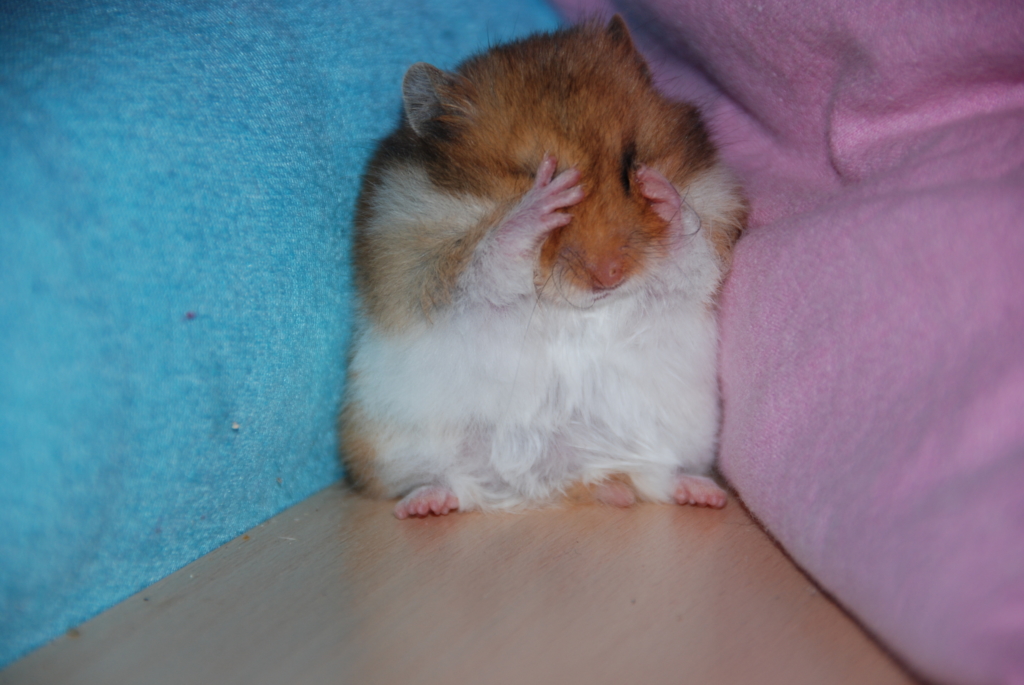
“More revealing was the way [rats] reacted when they chose poorly: They stopped, looked backward, often ate quickly, and rushed to the next station, and were more likely to wait longer once they got there. In contrast, rats that chose wisely tended to rest and groom themselves between meals. ‘We know their brains are doing the same calculation,’ says University of Minnesota neuroscience professor David Redish, measuring ‘the what-might-have-been that humans do when we feel regret.'”
— The Week, 27 June 2014
Researchers at the University of Minnesota this month uncovered a series of behavioral patterns among lab-rats; these patterns mirrored human regret-responses with alarming regularity. Rats, it appears, are capable not only of remorse but also of shame, social anxiety, possibly even high-functioning alcoholism.
Fired by their latest discoveries, these researchers have expanded their mission to include anthropomorphic behaviors among some of our larger rodents. Their methodology is as illuminating as their results. We include samples below for your surprise, delight, and mortification.
***
Can ferrets feel envy?
Three ferrets are placed in a large glass terrarium. The tallest ferret is given a book deal. By morning, the tall ferret has been decapitated and the other two have drafted the manuscript of a country-house mystery called The Ferret Trap. The theatrical version runs for over half a century in London’s West End.
Are weasels xenophobic?
Two American weasels are placed in a spacious controlled habitat. The following day, two more weasels arrive: Pierre, dressed like André Gide, and Abrar ibn Sharif, a Tunisian exile. The first American weasel, thanks to his fluency in French, finds himself on friendly terms with the new conscripts. The second American weasel negotiates a syndicated radio show and promptly makes a fortune broadcasting racist remarks about “foreign weasels who sap our resolve and steal our snacks.” The first weasel rubs his nose and writes an editorial in favor of pluralism that no one will read.
Is casual sex good for voles?
Researchers introduced two red-backed voles into a carpeted, softly lit plexiglass cube. Early-70s Marvin Gaye was piped into the habitat. The following morning, the female reported immense satisfaction and a heightened sense of self-esteem. The male, meanwhile, reported feelings of anxiety and emasculation, adding that “this is really why you don’t screw around with coworkers.”
Can guinea pigs know ennui?
Lab technicians placed two guinea pigs in a Georgetown row house. The first guinea pig they made assistant secretary of agriculture (wheat subdesk). The second guinea pig was given small domestic tasks, and otherwise did little work save certain clerical duties during tax season. By year five, the first guinea pig, whose name is Erik, has accepted a lucrative position at Wheat & Associated Starches for the Future, a prominent lobbying firm on K Street. The second guinea pig, whose name is Clothilda, has filed for divorce after years of subsisting on nothing but Zoloft and Cocteau.
Are muskrats capable of narcissism?
Four muskrats walk into a cage, except this cage is special and built of mirrors, so the four muskrats find themselves greeted by an infinitude of possible selves. Two muskrats succumb immediately to vanity, marveling at their reflected forms and ignoring the food and water apparatus entirely. The other two muskrats take out a second mortgage on the mirror-cage to fund a hair and beauty salon, thereby fleecing (in every possible sense) their vainer counterparts. [NB: This study may shed significant light on the perennial question of whether aquatic rodents are entrepreneurs.]
Do skunks “get” irony?
Researchers showered an adolescent male skunk in Axe® Body-Spray. After a brief period of sneezing, the skunk reported heightened senses of self-esteem and “general fuckability.” The answer therefore appears to be no.
Can chinchillas feel guilt?
Seven researchers perished in this experiment. The chinchillas disappeared from public life, though they left behind a note scrawled in the blood of a postdoctoral fellow: “You will all make very comfortable coats.” Despite the truncation of the project, our hypothesis of “no” does not seem implausible.
Do lemmings succumb to peer pressure?
Experiment postponed indefinitely after the lemmings went for a walk and never returned.
Ted Scheinman has written previously for Full Stop about Anthony Weiner and otters. He is our small mammal correspondent.
This post may contain affiliate links.







